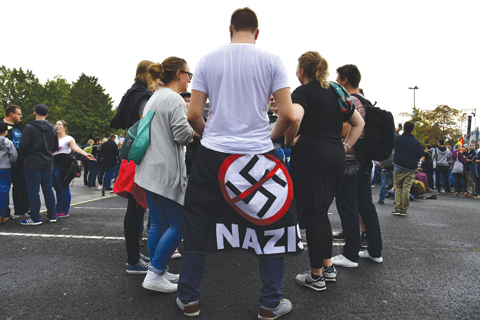Eastern city of Chemnitz rocked by xenophobic protests
 CHEMNITZ: A man shows an anti-nazi sign on a banner ahead of a free concert with several German bands to say “No” to the far right which has staged nationalist demonstrations after a fatal stabbing allegedly by two foreigners. — AFP
CHEMNITZ: A man shows an anti-nazi sign on a banner ahead of a free concert with several German bands to say “No” to the far right which has staged nationalist demonstrations after a fatal stabbing allegedly by two foreigners. — AFPCHEMNITZ: Chancellor Angela Merkel yesterday urged Germans to stand up against the far right's message of hate and division, after the eastern city of Chemnitz was rocked by xenophobic protests. Scenes of far-right protesters chasing down foreign-looking people in violent demonstrations last week against the fatal stabbing of a man, allegedly by an Iraqi, shocked Germany.
Amid the highly charged atmosphere in Chemnitz, a failed asylum applicant was sentenced to eight and a half years in jail for another fatal stabbing-in another case also seized on by the far right's anti-immigrant campaign. Merkel's spokesman Steffen Seibert said it was understandable that such crimes would provoke sadness and concern among the population.
But the marches by "violence-prone right-wing extremists and neo-Nazis have nothing in the least to do with sadness for a person or with concern for a city's cohesion", he said. "These people who march and are prone to violence-some have also shamelessly shown their closeness to Nazism-they stand neither for Chemnitz nor for Saxony overall, neither are they 'the people'," said Seibert, referring to a popular "We are the people" chant used by far-right protesters.
"We must make that clear to them," be it through political or legal means, he said. "Every citizen can also raise his or her voice to clearly show them their attitude against hate, against the attempt to divide this country." But the criticism of the right-wing extremist protesters was immediately rejected by far-right party AfD. "An entire state and its people are vilified here in general because there is a distinct and understandable resentment about the circumstances," Joerg Meuthen, AfD co-chief said at a street festival in Bavaria.
'Get off our sofas'
After a weekend of rival protests in Chemnitz that saw far-right demonstrators vastly outnumber counter-protesters by 8,000 to 3,000, calls have grown for the silent majority to mobilize. On Sunday, Foreign Minister Heiko Maas urged Germans to "get off our sofas and open our mouths" against xenophobia. Later yesterday, several left-leaning and anti-fascist punk bands, are due to perform in a free concert under the motto "there are more of us", with several thousands expected to join in the protest against racist violence.
A "window demo" call has also gone out on social media for those who cannot make it to Chemnitz to hang a colorful poster on the window or balcony to show their support for the anti-racist cause. The unrest has once again put the spotlight on Merkel's liberal refugee policy that led to the arrival of more than one million asylum seekers since 2015.
Resentment against the newcomers runs particularly deep in Saxony state, where Chemnitz is located, and the AfD has won strong support in the region with its anti-migrant campaign. Surveys suggest it is poised to become Saxony's second biggest party in next year's regional elections.
In western Germany, the AfD has also been organising protests in the city of Kandel, where a teenage girl was stabbed to death by a failed asylum applicant claiming to be from Afghanistan.
'Intolerable'
Yesterday, the juvenile court in the western town of Landau sentenced the accused, identified only as Abdul D, to a jail term over the killing. Abdul D had admitted to the court to stabbing the girl at a drugstore in the town of Kandel on December 27. Prosecutors believe he acted out of jealousy after the girl broke up with him.
Besides his nationality, doubts have been raised about his age, which he said was 15 at the time of the crime. An expert had estimated his age as between 17 and a half and 20 but, given the uncertainty, the proceedings were held behind closed doors and under juvenile penal rules.
Abdul D arrived in Germany in April 2016 and his request for asylum was rejected in February 2017 although he was not immediately deported. At the peak of the AfD-led protests over the killing, thousands marched in Kandel, but the rallies have since lost momentum. On Saturday, a demonstration in the town attracted 350 people, local police said. Rhineland-Palatinate state premier Malu Dreyer accused the far-right of exploiting the teenager's death for political gains, saying this was "intolerable". "It is the hope of all of us that once the trial is over, peace will return to Kandel," she said. - AFP









